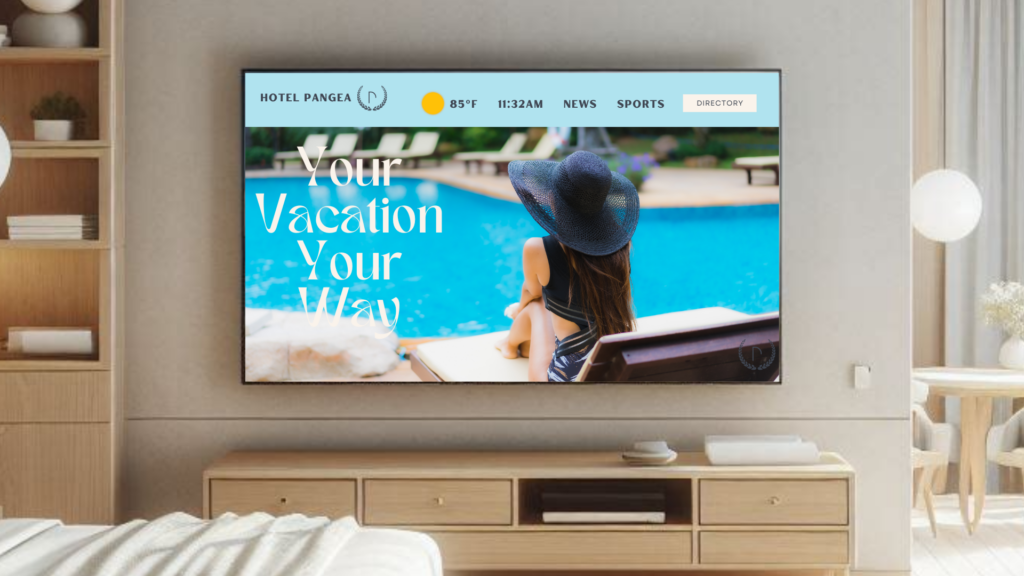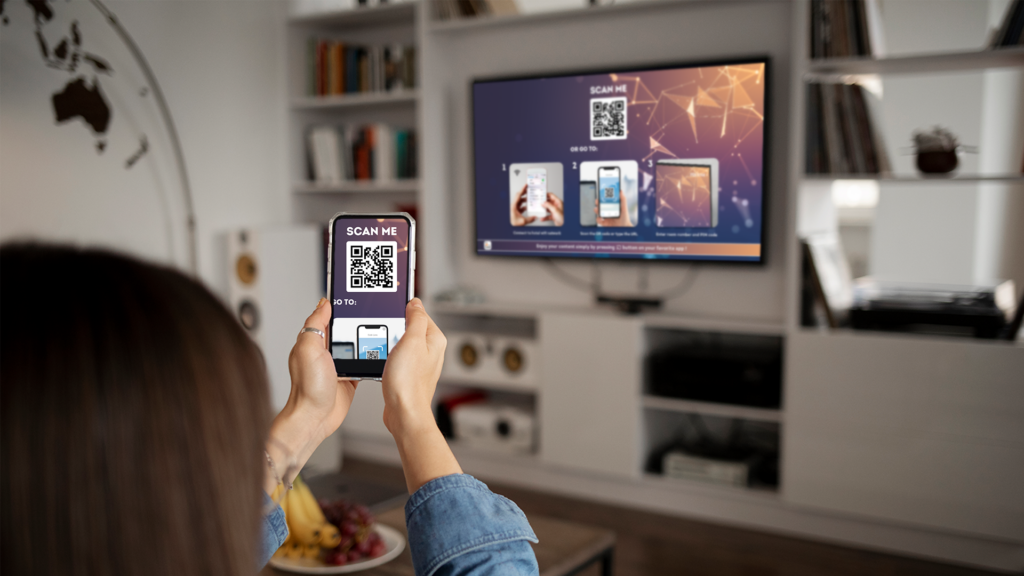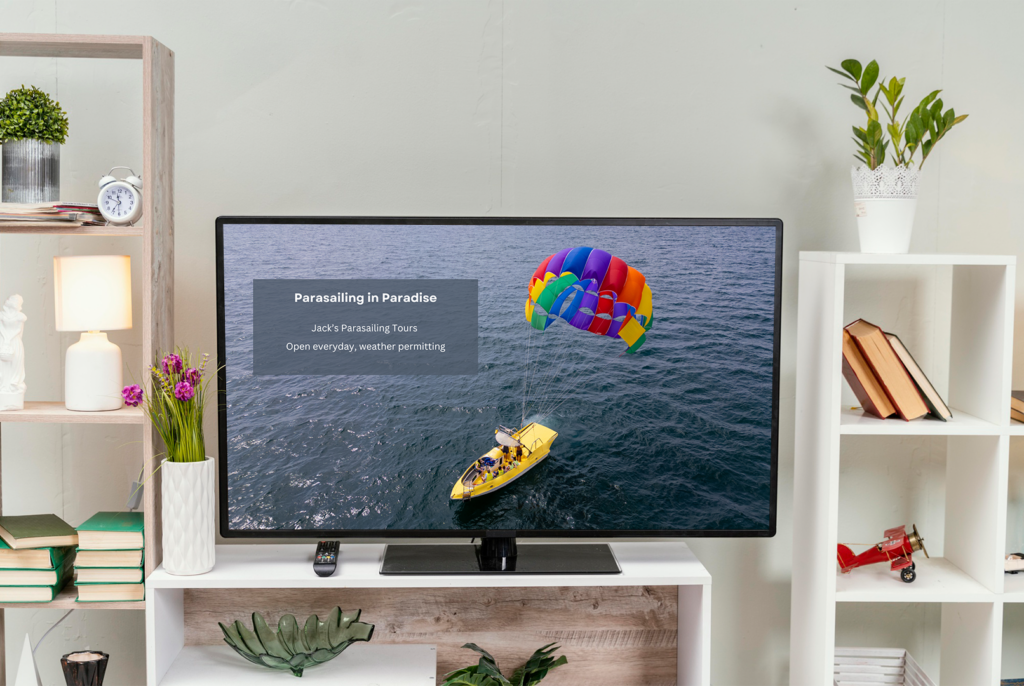Soluciones de TV para hoteles: la diferencia entre IPTV, casting y TV por cable

Con toda la tecnología moderna disponible hoy en día, los hoteles tienen una variedad de opciones de entretenimiento en la habitación para elegir. Los propietarios y gerentes de hoteles ahora deben decidir cuál de las muchas soluciones de TV para hoteles es la adecuada para sus huéspedes. Pueden elegir entre la televisión por cable, que está desactualizada y es costosa, el IPTV moderno pero caro, o una solución de casting para hoteles.
Los huéspedes ahora esperan experiencias iguales o mejores que las que disfrutan en casa, incluyendo acceso a servicios de streaming, contenido personalizado y menús interactivos. Los hoteleros enfrentan una decisión crítica al elegir entre IPTV, casting y televisión por cable tradicional, y la elección correcta puede mejorar significativamente la satisfacción del huésped y aumentar la eficiencia operativa a largo plazo.
En este artículo, exploraremos las tres soluciones de TV para hoteles, compararemos sus beneficios y limitaciones, y ayudaremos a los hoteles a determinar qué enfoque se alinea mejor con sus objetivos de experiencia para los huéspedes.
¿Cuáles son las diferentes soluciones de TV para hoteles?
Antes de entrar en comparaciones, es importante definir a qué nos referimos con soluciones de TV para hoteles. Las soluciones de TV para hoteles se refieren a las tecnologías y sistemas utilizados para ofrecer televisión y contenido multimedia en las habitaciones de los huéspedes. Normalmente, estas soluciones se dividen en tres categorías principales:
- Televisión por cable
- IPTV (Televisión por Protocolo de Internet)
- Casting (transmisión de invitados o uso compartido de pantalla)
Cada una de estas opciones ofrece su propio conjunto de características y compensaciones. Vamos a desglosarlas.
Televisión por cable tradicional

El cable ha sido durante mucho tiempo la solución predeterminada de TV para hoteles. A través de la distribución por cable coaxial, los hoteles ofrecen una lista de canales de transmisión y canales premium. El cable requiere receptores o decodificadores en cada habitación, que luego se conectan al servicio maestro del hotel.
Beneficios de la televisión por cable en los hoteles:
- Confiable y familiar: la mayoría de los huéspedes saben cómo usar la televisión por cable y aprecian tener sus canales favoritos.
- Implementación de bajo costo: muchas propiedades antiguas ya cuentan con infraestructura coaxial instalada.
- No se necesita ancho de banda de Internet: el cable funciona de forma independiente a la red del hotel, reduciendo la carga en el Wi-Fi.
Limitaciones de la televisión por cable en los hoteles:
- Personalización limitada: los huéspedes no pueden iniciar sesión en sus propias cuentas de streaming.
- Contenido estático: el cable carece de acceso a la carta y de menús interactivos.
- Menor compromiso: los viajeros más jóvenes prefieren cada vez más el streaming y los servicios OTT (over-the-top), lo que hace que el cable parezca anticuado.
- Menor compromiso: los viajeros más jóvenes prefieren cada vez más el streaming y los servicios OTT (over-the-top), lo que hace que el cable parezca anticuado.
Si bien el cable aún cumple una función en algunas propiedades, muchos hoteles están actualizando a soluciones de TV más modernas como IPTV o casting.
IPTV (Televisión por Protocolo de Internet)

IPTV entrega contenido de televisión y multimedia a través de la red IP del hotel. En lugar de cables coaxiales, IPTV utiliza conexiones Ethernet para ofrecer tanto canales en vivo como contenido bajo demanda a través de un cabezal centralizado. La mayoría de las soluciones de TV para hoteles basadas en IPTV permiten integrar servicios como guías de programas interactivas, video bajo demanda (VoD) y portales de invitados con la marca del hotel.
Beneficios del IPTV para hoteles:
- Experiencia interactiva para el huésped: IPTV permite pantallas de bienvenida, promociones del hotel, pedidos de servicio a la habitación e información local directamente en la TV.
- Contenido a la carta: los huéspedes tienen acceso a películas y series de TV en cualquier momento.
- Marca y personalización: la interfaz de usuario puede personalizarse para mostrar la marca del hotel e incluso mensajes personalizados.
- Gestión centralizada: las actualizaciones se pueden enviar de forma remota a todas las habitaciones porque todos los televisores están conectados a una única red IP.
Limitaciones del IPTV para hoteles:
- Mayores requisitos de ancho de banda: el IPTV necesita una red de datos sólida para transmitir contenido a cada habitación.
- Inversión inicial: las propiedades pueden necesitar actualizar su infraestructura existente a Ethernet, lo que puede ser costoso en edificios antiguos.
- Dependencia del proveedor: muchos sistemas de IPTV son propietarios, lo que significa que los hoteles pueden quedar atados a un solo proveedor o plataforma.
- Costo de suscripción elevado: debido a su alto nivel de interactividad y personalización, el IPTV tiene un precio significativo, lo que lo hace accesible principalmente para hoteles y resorts de 4 y 5 estrellas.
A pesar de estos desafíos, el IPTV se destaca como una de las soluciones de TV para hoteles más potentes porque permite un control total sobre el entorno digital de la habitación. El IPTV es la opción ideal para resorts y hoteles de alta gama.
Soluciones de casting

El casting se ha convertido en una de las soluciones de TV para hoteles de más rápido crecimiento porque ofrece la misma experiencia que los huéspedes ya disfrutan en casa. En lugar de seleccionar contenido proporcionado por el hotel, los huéspedes pueden transmitir desde sus propias suscripciones “casteando” desde su dispositivo móvil o portátil al televisor de la habitación. La mayoría de las soluciones de casting para hoteles utilizan dispositivos compatibles como Google Chromecast o Apple TV, junto con sistemas seguros de autenticación para huéspedes.
Beneficios del casting para hoteles:
- Lleva tu propio contenido: los huéspedes usan sus propias cuentas de Netflix, Hulu, YouTube u otras.
- Experiencia de usuario sencilla: los huéspedes no necesitan iniciar sesión en el propio televisor; simplemente hacen casting desde su propio dispositivo.
- Costos más bajos de licencias de contenido: los hoteles no necesitan adquirir licencias de VoD ni derechos de contenido.
- Alta satisfacción de los huéspedes: obtienen una experiencia fluida y familiar sin necesidad de aprender una nueva plataforma.
- Personalización y customización: los hoteles pueden mostrar presentaciones y videos personalizados, tal como lo harían con IPTV.
Limitaciones del casting para hoteles:
- Dependencia de los dispositivos personales: si el huésped no tiene un smartphone o cuentas de suscripción, el casting pierde valor.
- Demanda de ancho de banda: el casting requiere Wi-Fi de alta velocidad en cada habitación; de lo contrario, la calidad de la transmisión se verá afectada.
- Menor interactividad: en comparación con el IPTV, el casting ofrece menos interactividad, como la ausencia de servicio a la habitación, check-out, control de temperatura, etc. a través de los televisores de los huéspedes.
El casting destaca en propiedades con redes inalámbricas sólidas y un público experto en tecnología. Es especialmente valioso para hoteles boutique, propiedades de estadías prolongadas y marcas que apuntan a un público más joven.
Qué considerar al elegir entre IPTV, casting y cable
Dado que las soluciones de TV para hoteles varían en funcionalidad e inversión, los hoteles deben evaluar cuidadosamente los siguientes factores:
Criterios | Televisión por cable | Transmisión | IPTV |
|---|---|---|---|
Personalización para el huésped | Bajo | Medio | Alto |
Requisitos de infraestructura | Bajo | Medio | Alto |
Costo de implementación | Bajo | Medio | Alto |
Costo de suscripción recurrente | Alto | Bajo | Alto |
Promocionar los servicios del hotel | Bajo | Alto | Alto |
Opciones de entretenimiento | Bajo | Alto | Alto |
Familiaridad del huésped | Alto | Medio | Bajo |
Combinando múltiples soluciones de TV para hoteles
Muchas propiedades modernas ahora están implementando modelos híbridos. Por ejemplo:
- Budget Friendly: Cable + Casting – Maintains live channels while giving guests a personalized “IPTV-like” experience with custom slideshows and videos, plus access to their favorite streaming apps. This option satisfies both young and old guests as well as hotel owners with its budget-friendly offerings.
- Experiencia completa: IPTV + Casting – Offers exclusive branded content and fully interactive guest features through IPTV including room service, temperature control, remote check-out, and more. Additionally, allows guests to cast their own streaming services or access pay-per-view services and channels over IP.
Al combinar soluciones de TV para hoteles, los operadores pueden adaptarse a las diferentes preferencias de los huéspedes y maximizar el uso de la infraestructura existente.
Conclusión: ¿Qué solución de TV para hoteles es la adecuada para usted?

En última instancia, las mejores soluciones de TV para hoteles dependen de los objetivos de su propiedad, la infraestructura y la demografía de sus huéspedes. El cable sigue siendo una opción rentable cuando la modernización no es posible de inmediato. El IPTV ofrece una gran capacidad de personalización de marca, interactividad y nuevas oportunidades de ingresos. El casting proporciona una experiencia de transmisión similar a la del hogar que encanta a los viajeros de hoy.
Los operadores de hospitalidad con visión de futuro se enfocan en la flexibilidad, invirtiendo en soluciones que ofrezcan lo mejor de todos los mundos. Al adoptar la combinación adecuada de IPTV, casting y cable, los hoteles pueden mejorar la experiencia del huésped, impulsar la lealtad y mantenerse a la vanguardia en un mercado cada vez más competitivo.
